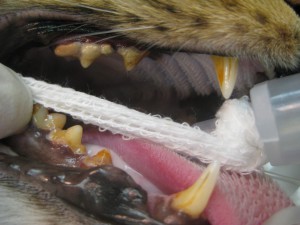Does your cat’s mouth seem a bit tender when touched or is she more cautious when she eats? Your cat may be suffering from dental disease. According to the American Veterinary Dental Society, 70 percent of cats show some sign of oral disease by age three. Cats can develop plaque and tartar build up just like people. This is caused by oral bacteria and food. Remember, cats never brush their teeth!
February has been designated as National Pet Dental Health Month to help bring attention to the importance of your cat’s oral health. One of the most important things you can do as a cat owner is to make a trip to your veterinarian to have your cat’s teeth, gums and oral cavity checked.
Signs of dental disease
Between veterinary appointments, it’s good idea to watch for signs of any issue that could be developing. If your cat is eating more cautiously than usually, there could be tenderness in the gums caused by developing dental issues. You can look at your cat’s teeth or gums by lifting up his or her lip to check.
If anything seems abnormal, it’s best for your veterinarian to check your cat’s mouth to see if it’s time for a cleaning. What should you look for on a routine basis :
- Discolored, broken or crooked teeth
- Growths in the mouth
- Red, swollen or bleeding gums
- Tartar crust or build up along the gum line
- Bad breath
- Drooling
- Swollen cheek
- Missing teeth
Changes in your cat’s general behavior can also mean there is a problem. If your cat is less willing to play or starts sleeping more this could be a sign of dental disease.
Health issues related to dental disease
As with people, plaque can build up in your cat’s mouth and lead to tartar. Plaque and tartar build up leads to periodontal disease that can cause oral pain, infection, tooth loss and a variety of other complications. Tartar can also lead to gingivitis, which causes other dental issues.
Your cat’s oral health affects so many other aspects of your cat’s overall health. Dental disease can cause damage to other organs such as the heart, kidney and liver. When this happens cats develop other health problems because of the inflammation and infection associated with dental disease.
A healthier mouth for your cat
The best way to keep your cat’s oral health on track is to have annual checks and cleanings with your veterinarian. You can also keep your cat’s mouth healthier by brushing and caring for your cat’s teeth. To learn more about feline dental health, check out these past blog posts :
- What’s That You Say – Brush My Cat’s Teeth!
- How Much Does A Cat Dental Cleaning Cost
- Is it Safe to Have My Cat’s Teeth Cleaned?
- If you would like to schedule an appointment for your cat click here : http://northernilcatcliniccom.web.siteprotect.net/schedule-appointment/
